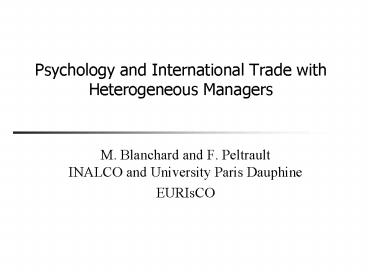Psychology and International Trade with Heterogeneous Managers - PowerPoint PPT Presentation
1 / 20
Title:
Psychology and International Trade with Heterogeneous Managers
Description:
The level of entrepreneurship differs across countries ... risk premia for entrepreneurs (except the indifferent one n) which flows out to ... – PowerPoint PPT presentation
Number of Views:44
Avg rating:3.0/5.0
Title: Psychology and International Trade with Heterogeneous Managers
1
Psychology and International Trade with
Heterogeneous Managers
- M. Blanchard and F. PeltraultINALCO and
University Paris Dauphine - EURIsCO
2
European Commission Europe suffers from an
entrepreneurship deficit in comparison to the US
- The level of entrepreneurship differs across
countries - Psychology of managers can explain these
differences - The purpose of this paper is to challenge the
link between the psychology of managers,
entrepreneurship and international trade
3
Modelling the psychology of managers
- Kahneman and Tversky and Psychologists show that
managers distort objective probability - Managers can be either optimistic or pessimistic
- A manager is optimistic if his perceived
probability of success is higher than the
objective probability g(q)gtq - A manager is pessimistic if his perceived
probability of success is lower than the
objective probability g(q)ltq
4
Modelling the heterogeneity of managers
- Managers are ranked in the continuum
according to - their perceived probability of success g?(i)
- their degree of optimism Y?(i) g?(i)/q.
5
The framework
- Each manager chooses between a risky project (R,
?) and a certain project (C) - Project C provides the income
- Project R provides the income with
probability q or else 0. - Managers are characterized by their perceived
probability - Risk is idiosyncratic to each managers project
- There is neither insurance market nor perfect
diversification markets are incomplete - Commodity C is the numéraire.
6
Lack of Diversification
- Managers do not diversify their activity they
spend all their time in the implementation of
their project - (documented by Moskovitz and Vissing-Jorgensen
(2002)) - This binary behavior ? Yaaris preference
function - there is plunging behavior (Yaari (1987))
7
Decision Rule with the Dual Theory of Yaari
- Manager i chooses the risky commodity (R) if
- The relative income depends on
- Relative productivities
- The relative price of the risky commodity (p)
- Each agent can anticipate the general
equilibrium price if the distribution function of
perceived probability is common knowledge.
8
Autarky equilibrium diagrammatic exposition
9
Autarky equilibrium is a second best
- In autarky, general equilibrium exhibits a
sub-optimal supply of the risky commodity (ex
post) - A globally pessimistic country suffers from an
entrepreneurship deficit - A globally optimistic country suffers from an
entrepreneurship excess
10
Comparative advantages
- Assume country O is more optimistic than country
P
11
Free trade equilibrium
- Free trade equilibrium price exists and is
unique - When demand conditions are identical, country O
exports commodity R while country P exports
commodity C.
12
Welfare Analysis the need for two criteria
- Ex post criterion effective consumption
- Ex ante criterion specific to each manager i
- with
- Problem of aggregation Hicksian compensated
incomes are required.
13
Simulations
- There is no analytical solutions for the
resolution of equilibria. - Numerical simulations are needed for
- equilibria prices, the number of
entrepreneurs, welfare analysis. - Ex ante welfare consequences of free trade are
simulated by the aggregation of heterogeneous
managers ex ante welfares.
14
Ex post welfare analysis
- Country P (country O) is better off with trade
when the world is globally optimistic
(pessimistic). - Simulation results
15
Ex ante welfare analysis
- Country O and the world are always better off for
all the specifications tested while country P can
be worse off - Simulation results
16
Heterogeneity matters
- When managers have the same distortion of
probability within a country, both countries are
ex ante better off with trade (without
heterogeneity there are no ex ante risk premia in
autarky). - (Blanchard and Peltrault 2004).
- Ex ante losses in trade are revealed by the
introduction of the heterogeneity of managers
there are positive ex ante risk premia for
entrepreneurs (except the indifferent one n)
which flows out to country O with the opening of
trade.
17
Economic Interpretation an example when the
world is optimistic.
- In this case, the Ex post Risk Premium is
negative - Negative risk premia flow in country O where the
level of entrepreneurship is increasing - The Ex ante Risk Premium is subjective and always
positive - Positive ex ante risk premiums flow in country O
which is then better off
18
The psychological distance (Zp) between countries
and the gains from trade
19
Economic interpretation the world
- World can be worse off ex-post free trade may
increase the entrepreneurship excess at the world
level. - International trade can amplify the autarky
distortions as price is a signal of
psychologically biased productivities.
20
Conclusion
- Trade can be grounded on psychology of managers
- Psychological distortions can be amplified by
trade - Heterogeneity of managers reveals salient welfare
effects - Trade policy decisions are taken that can be
later regretted - The best policy is to correct distortions with
institutional or financial factors bankruptcy
laws, access to credit































